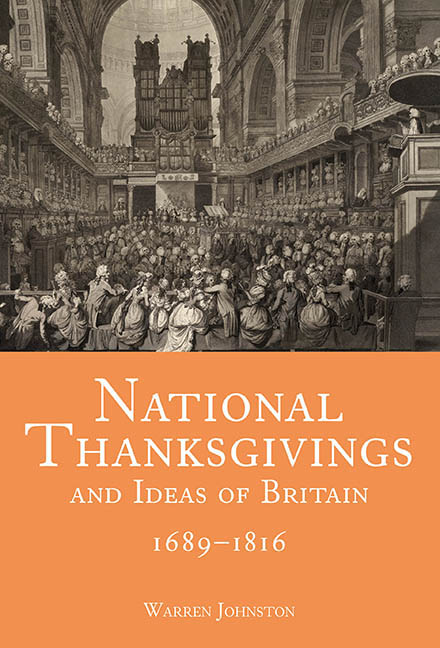Book contents
- Frontmatter
- Dedication
- Contents
- Acknowledgements
- Notes on elements of the text
- List of general thanksgiving days 1689–1816
- Introduction
- 1 Sermons and thanksgiving-day sermons in the long eighteenth century
- 2 Thanksgiving-day sermons – purposes and meanings
- 3 ‘The Palladium of our Safety’ – Providence and Britain
- 4 Political theory and principles
- 5 ‘This Carping Age’ – the politics of unity and discord
- 6 War
- 7 Costs of war and consequences of peace
- 8 Commerce and Empire
- 9 Anglicanism, dissent, anti-Catholicism, and infidelity
- 10 Others and Britons
- Conclusion
- Appendix A Thanksgiving-day preachers’ and sermon details
- Appendix B Denominational breakdown of thanksgiving-day preachers
- Appendix C Main scriptural texts used for thanksgiving-day sermons
- Bibliography of primary sources
- Bibliography of secondary sources
- Index
2 - Thanksgiving-day sermons – purposes and meanings
Published online by Cambridge University Press: 02 May 2020
- Frontmatter
- Dedication
- Contents
- Acknowledgements
- Notes on elements of the text
- List of general thanksgiving days 1689–1816
- Introduction
- 1 Sermons and thanksgiving-day sermons in the long eighteenth century
- 2 Thanksgiving-day sermons – purposes and meanings
- 3 ‘The Palladium of our Safety’ – Providence and Britain
- 4 Political theory and principles
- 5 ‘This Carping Age’ – the politics of unity and discord
- 6 War
- 7 Costs of war and consequences of peace
- 8 Commerce and Empire
- 9 Anglicanism, dissent, anti-Catholicism, and infidelity
- 10 Others and Britons
- Conclusion
- Appendix A Thanksgiving-day preachers’ and sermon details
- Appendix B Denominational breakdown of thanksgiving-day preachers
- Appendix C Main scriptural texts used for thanksgiving-day sermons
- Bibliography of primary sources
- Bibliography of secondary sources
- Index
Summary
In 1763 Richard Richmond, vicar of Walton in Lancashire, preached a sermon in Dunkeld, Scotland on the occasion of the thanksgiving day to celebrate the treaty with France to end the Seven Years’ War. Richmond told his audience that their obedience to the directive to thank God for this peace ‘is not the unmeaning sacrifice of fools, but both a reasonable and laudable service’. Richmond's statement stipulated his listeners’ and readers’ several responsibilities for the occasion: not only were Christians to properly acknowledge God's blessings in their lives but also, as British subjects, they were to attend to a duty prescribed by their government for the advantages they had received as part of a nation that had benefited from providential dispensations. Thanksgiving days were moments when religious and secular obligations intersected in this particular way in churches in England, Wales, Scotland, and Ireland, as well as, at times, in British colonies throughout the long eighteenth century, when the nation as a whole was meant to come together to express its appreciation to God. In this, thanksgiving days conveyed a number of meanings, fulfilled a variety of purposes, and satisfied a series of obligations for preachers, congregations, and their government.
The sermons preached and published for thanksgiving days embodied a range of ideas about the purpose and meaning of thanksgiving to those who delivered, heard, and read them. These included the historical and religious origins of thanksgiving observances, their importance to the state, and the significance of commemorating and worshipping together as a nation. Throughout a period that lasted over 125 years, the sermons reiterated similar messages about the need to properly observe these commemorations, to recognise the source of blessings, and to acknowledge what was required to have those advantages continue. The biblical texts chosen as foundations for the sermons were used as more than the basis of theological and doctrinal lessons, instead relating and contextualising contemporary circumstances within a larger, divine political and religious plan. In all of these things, Britain was depicted and positioned as a central, unique component in European and world affairs. In their elaborations on these grand considerations, the ministers who preached and published sermons perceived their efforts as speaking to issues of national interest and good, but they did so by expressing their views and opinions in a variety of ways.
- Type
- Chapter
- Information
- National Thanksgivings and Ideas of Britain, 1689–1816 , pp. 31 - 58Publisher: Boydell & BrewerPrint publication year: 2020



